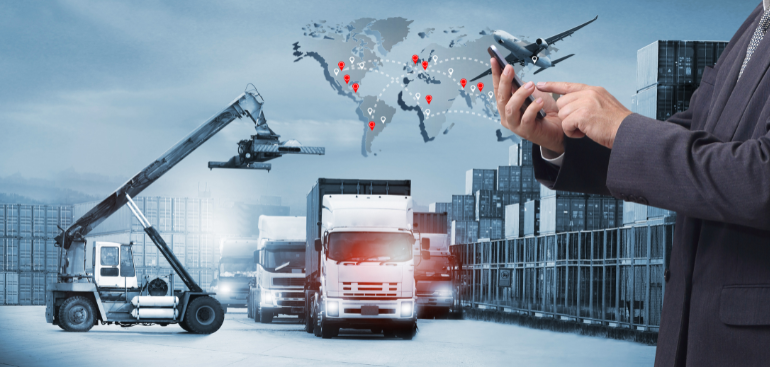Changing Times
Covid-19 has had a visible impact on many businesses in various industries over the past 2 years. Through the rise and fall of many companies in these times, we see a paradigm shift in the business landscape. Prominently, surviving businesses have accelerated their adoption or even shifted majority of their businesses to digital platforms and adopted new measures of digital transformation. With an increasing presence of e-commerce and lowered manpower due to the pandemic, this further strains the logistics and transportation side of the supply chain industry, be it a B2B or a B2C company.
As a result, forward-looking leaders of the supply chain industry have to find other reliable methods to ensure the sustainability of their companies. With logistics expenditures taking up a higher proportion of the sales revenue, it makes sense for leaders to keep a close eye on the cost of logistics and transportation of their products, and to find the most cost-efficient means to achieve their business goals.
More than Meets the Eye
One of the many determining factors for the success of a business is ensuring that all goods/services are delivered in a satisfactory manner to the consumer. When it comes to physical goods, occasional damages during transportation, errors, and wrong delivery, are bound to happen now and again regardless of the precautions taken. Such incidents would add to sales returns costs, as defect products would have to be transported back to the company warehouse. It is of vital importance for those in the logistics and transportation (L&T) industry to take into account such additional costs to ensure that they allocate sufficient resources for the continued operation of their businesses.
This would also provide a great opportunity for businesses in this industry to take advantage of existing digital technologies to assist in mitigating any losses that may arise in these circumstances.
Digital Transformation in the L&T World
Digital technologies have long been adopted by the logistics and transportation industry and this has only accelerated further with the onset of the pandemic.
By adopting new digital technologies, logistics and transport companies can address major challenges of the sector:
- Digital platforms allow companies to uncover what happens behind business operations and generate valuable insights. Meanwhile, more advanced technologies, such as machine and deep learning, can be applied to expedite daily operations.
- Vehicle and equipment monitoring allows the machinery to undergo preventive maintenance instead of relying on vehicle logbooks.
- Artificial Intelligence (AI), along with 5G technology, allows for the automation of repetitive and tedious tasks, optimising their main logistics operations.
However, digital transformation also threatens to fundamentally disrupt logistics operations if the risks involved are not identified and minimised. Some of the issues that may arise include:
- The possibility of digital disruption exponentially increases with more and more digital technologies being applied to daily operations, compounded with an ever increasing reliance on digital technology, regardless of company size.
- Grey areas of regulatory and compliance protocols have been frequently overlooked by companies when they are implementing their digital strategies. Despite regulations from governmental authorities regarding how to utilise such technologies, its growing complexity may render an unknowingly less-than-ideal compliance situation for entities.
Combining Two-Parts to Make a Whole
The process of digitisation (digital transformation) is unavoidable in the future. In today’s fast-paced world, only the forward-looking can reap the most benefits. Moreover, Covid-19 has managed to blindside many companies, resulting in adaptations that are now necessary to not have them turn turtle.
With growing uncertainty of what the future holds, companies should make use of the challenges that come their way and turn them into opportunities that can be used for the business to thrive.
Much like how it was before the pandemic, effective leaders who step out of their comfort zone often bring a sense of direction and situational awareness that is deep-rooted within themselves. As a result, their respective companies can continue and adapt accordingly by following consumerism trends and skilful management of the challenges at hand. Depending on the needs of your business, continuing with the expansion of digital transformation processes and addressing aspects of reverse logistics would be a good next step to consider working towards.
The logistics and transportation industry have been booming due to an increase in business and consumer demands around the world. While the iron is still hot, the time is right to update relevant contingency plans within your business model. In the logistics and transportation industry that has had a constant pressure to meet demands, companies that have accelerated into digital transformation will definitely hold a greater advantage, which would be relied on for recurring revenues in the future.
Chief Technology Officer-as-a-Service (CTO-as-a-Service)
One of the ways businesses can build their IT and digital capabilities is by making use of government resources and other support services available to ensure that they stay ahead in the competitive market. CTO-as-a-Service is an initiative under the SMEs Go Digital Programme developed by the Infocomm Media Development Authority (IMDA) to help SMEs in Singapore identify and access the resources they need to digitally transform.
SMEs that meet the eligible criteria can have their first Digital Consultancy Service and subsequent first Project Management Support provided free of cost by our experts.
With the right tools, businesses can learn from other SMEs as well as perform their own self-assessment of digital needs which will potentially bridge the technological gap across industries.
Conclusion
Despite the many challenges faced, Covid-19 is just another litmus test of the adaptability of the industry. However, just reacting and adapting may be insufficient in the near future. Your next step is what might differentiate you from your competitors in the industry and move you further up the line.
RSM has only touched the surface of a widespread pool of possibilities on how to ensure continued growth in a fast-paced changing environment and we understand the different views and needs of leaders in this industry.




